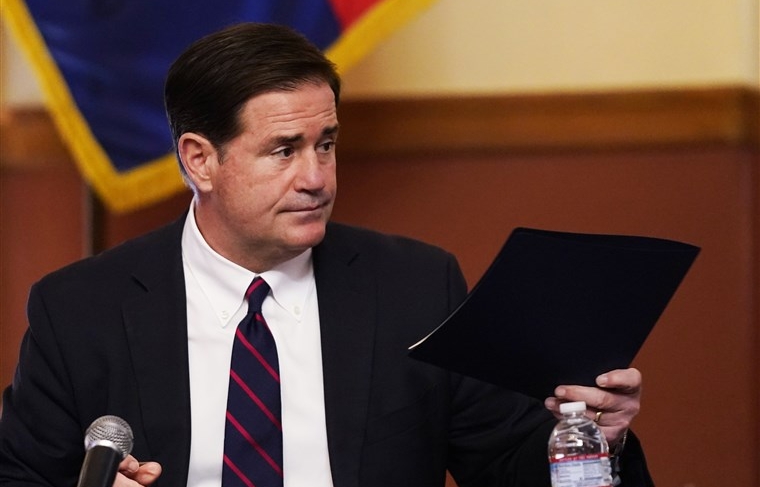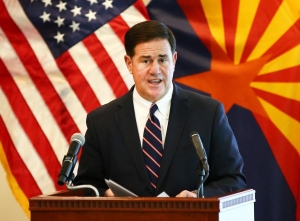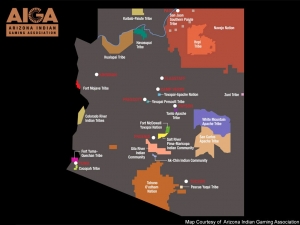Arizona Sports Betting Bill Takes 1 Step Forward and 2 Steps Back

Arizona sports betting lives to see another day (or does it) after the Senate Appropriations Committee passes the bill through 5-4. Sports betting moved forward after lawmakers packaged it with a historic horse racing bill to save the industry.
Arizona SB 1794 (historic race wagering bill) NOW combined with SB 1797 (fantasy sports, event wagering) on 5-4 vote barely gets a do pass recommendation out of Sen. Appropriations Committee #Arizona #legislation #amendment #sportsbetting #historichorse #indiantribes
— Sweet Lou Monaco (@loumonaco) February 24, 2021
Republican Committee Chair David Gowan introduced an amendment to the historic horse racing bill, attaching sports betting. Gowan sponsors the HHR bill and decided it was best to marry the two. Something Gowan missed is that if the tribes are not behind this bill, it could be short lived.
The news comes after last week when the Appropriations Committee originally decided to pass the sports betting bill while keeping the HHR bill behind. Now, there is a chance that sports betting is in jeopardy in Arizona after the HHR bill potentially violates tribal-state compacts.
Lawmakers spoke on Tuesday about how tying the bills together does not violate any current laws and only helps the gaming industry expand further.
Who Supports The New Arizona Sports Betting Bill?
Now that SB 1797, the Arizona sports betting bill, and SB 1794, the state’s HHR bill are tied together, this could make things more interesting.
Tribal groups are against the HHR bill as it will allow racetracks to install video terminals that bettors could use to place bets on old horse races. The tribes argued that these would act like slot machines and take away revenue from the Indian casino business.
 The effort Gov. Doug Ducey put in creating a deal with the tribal groups could be all for nothing depending on how the tribes feel about the combination of sports betting and the HHR bill.
The effort Gov. Doug Ducey put in creating a deal with the tribal groups could be all for nothing depending on how the tribes feel about the combination of sports betting and the HHR bill.
As of writing, Ducey has all 18 tribal groups on board with legalized sports betting at their casinos, along with an additional 10 sports betting licenses that could be used at their locations and professional stadiums in Arizona. Many tribal casinos were not interested in creating online sportsbooks.
BetMGM, DraftKings, and FanDuel have supported and favor passing the current sports betting bill.
Tuesday’s hearing saw the full session question historic horse racing’s legalities and questioned if it violated gaming compacts with the tribes. Lawyer Kurt Altman argued that the HHR bill would not enact the “Poison Pill,” which was written into a tribal compact that would allow tribal groups to control gaming in the state.
However, in 2018, Attorney General Mark Brnovich argued that something like the historic horse racing bill would trigger the poison pill putting both bills in jeopardy of falling due to legal standards.
What is the Poison Pill?
 The “Poison Pill” was written into the Tribal-State Compact to help keep gaming exclusive to tribes and generate revenue and build facilities for tribal communities.
The “Poison Pill” was written into the Tribal-State Compact to help keep gaming exclusive to tribes and generate revenue and build facilities for tribal communities.
This also helped banks and investors know that tribal groups were the only ones getting gaming, which are located further away from larger populated cities in Arizona. This has helped generate revenue from gaming in rural areas helping small local economies.
With tribes guaranteed to generate revenue from gaming without third-parties coming in and taking revenue shares, it helps the groups reinvest in their own communities from exclusivity in casino gaming.
The “Poison Pill” was written into the Tribal-State Compact. It says that any change in law, either voted by lawmakers or Arizona residents, allows for gaming expansion off tribal grounds, then permits tribes to offer gaming without limitations. This also means tribal groups would not have to share revenues with cities or the state.
If the “Poison Pill” is triggered by commercial gaming, tribes have no limitations on the games they offer from slot machines or the number of casinos they operate. As of writing, revenue sharing from tribal casinos brings in $100 million annually.
So, the “Poison Pill” is kind of a big deal.
What’s Next for Arizona Sports Betting?
The setup of the combined bills could tie-up legal battles in court for years to come. Tribal groups now want HHR in Arizona, but other lawmakers and lawyers have said that the HHR bill does not violate the Tribal-State Compact.
If tribes withdraw support from sports betting, other bookmakers will follow suit, killing Arizona’s dream. The Senate is setting itself up for a possibly messy hearing in the coming weeks over the joint bills.
 However, hope remains on the House side. Its sports betting bill will be voted on in the coming weeks, and if it passes, the bill will be faced up against the joint sports betting and HHR bill on the Senate floor. HB 2772 has a much easier time getting through both chambers than the Senate bill at the moment.
However, hope remains on the House side. Its sports betting bill will be voted on in the coming weeks, and if it passes, the bill will be faced up against the joint sports betting and HHR bill on the Senate floor. HB 2772 has a much easier time getting through both chambers than the Senate bill at the moment.
Overall, there is still a lot of support for the HHR bill to go through, but tying it with the sports betting bill puts it in jeopardy, and we will need to find more support to guarantee its backing.
However, the elephant in the room will be around whether or not the “Poison Pill” will have to be enacted along with tribal groups potentially pulling out of backing sports betting. Expanding the gaming industry, and Arizona Sports Betting specifically, is turning into a minefield.